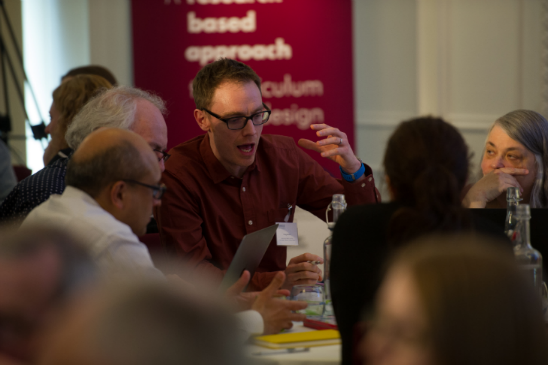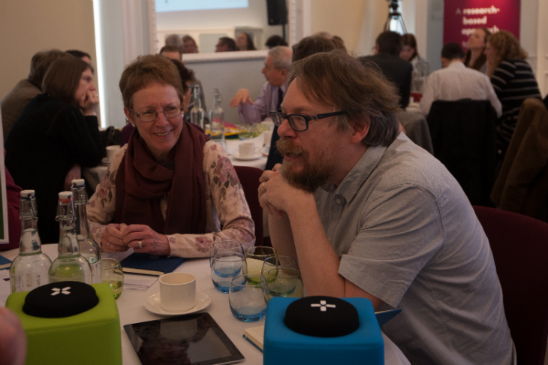Look around you. How many years of mathematical education experience are in the room you currently reside in? Is it just you, or are you in a staffroom, a classroom, an office or a public space? How many years would you alone say you have in mathematics education (and how have your views changed in that time)?
Last week, we counted something that counts: how many such years we had collectively at the Cambridge Mathematics Symposium 2018, an event designed to update our wonderful maths education community on the progress of the Cambridge Maths Framework and to ask for their views on some of the fascinating questions we are currently addressing. If I tell you that we had around 50 people in the room and a sum total of somewhere near a millennia of maths education experience between us, this may give you pause for thought (it certainly did us). But of course, this one piece of data doesn’t tell you everything, and certainly can’t begin to capture the breadth of expertise congregated there: this event brought together researchers, maths curriculum designers, assessment specialists, regulators, experts in professional development, teachers and policy makers.

Why did we want to bring together such a varied group? Just about three years ago we launched the idea of Cambridge Maths. Now that we’ve got something significant to share it felt like the right time to invite those who have supported us, and others who operate in the public space of maths education, to join us for the day. The intention was to say a thank you, and to describe the progress we have made so far in the design of the Framework. We also wanted to provide a forum for discussion – with guests who we predicted would not fully agree – on some topics which are fundamental; generally to maths education everywhere and specifically to the Cambridge Maths Framework.

After an introduction by Elizabeth Cater of CUP and a presentation by the Cambridge Maths team, the first topical debate was about who determines and curates the mathematics curriculum. Mathematicians? Businesses? Researchers? Teachers? Parents? Students? In many countries there is a well-established routine for curriculum renewal whilst in the UK our current strategy seems to be determined largely by who has the ear of policy makers. Professor Geoff Wake argued for the content to recognise the importance of modelling in order to make the curriculum more in touch with the uses of mathematics. Dr Tony Gardiner compared the model to the development of modern medicine (are we barber-surgeons, ‘hacking messily but effectively’?) and emphasised the importance of finding a consensus shaped by analysis and reflection, after which the possibilities for additional content could be considered.

Digital technology is not only the subject of curriculum; it is an object through which learning is mediated, and in the second round of presentations we shared the conditions under which digital mathematics becomes embedded in the curriculum in a way that might enhance accessibility, engagement or conceptual understanding. Dr Alison Clark-Wilson analysed what was needed at the system level and Professor Merrilyn Goos built on this to explore the opportunities at subject, classroom or task level but remarked that, despite the affordances of digital technology, the actual curriculum hasn't changed in content or order for a very long time. Have we been missing an opportunity?
Our final presentations explored the connections between curriculum and assessment. Professor Andy Noyes described the assessments we currently have in the UK as reductive and unidimensional, and explored a vision whereby the Framework could have a very positive impact on teacher discourse about connecting up mathematics itself, as well as pedagogical subject knowledge. Finally, former HMI Jane Jones focused on formative assessment and the importance of teacher expertise in knowing what questions to ask and what the answers uncovered.

With plenty of time given for table discussions – and the tables carefully seeded to promote cross-contextual debate – the lively chat was rich with palpable energy. Adding further richness were the international contributions from Mauritius and Austria (and what a coup to have Zsolt Lavicsa from the International Geogebra Institute!) through a live video link – reminding us that Cambridge Maths has a wider remit than just the UK, and that mathematics education is – or should be – a truly global, collaborative endeavour.
We are confident that those thousand years of experience were put to good use – but you can judge for yourself by watching the full presentations or edited highlights here. In the end, we know that the value of a person is so much more than their accumulated years of experience and here at Cambridge Mathematics we are interested not only in established expertise but in innovation and creativity – so do get in touch if you would like to be more involved in our extraordinary and ambitious work. (You’d be in excellent company.)
